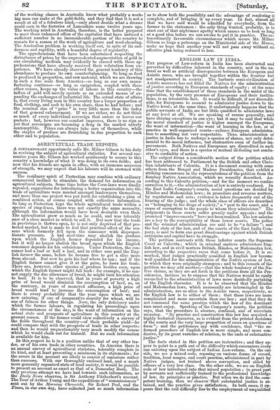AGRIcumr - RAL TRADE REPORTS.
A CONTEMPORARY opportunely palls Mr. Milner Gibson to his duty in reviving the subject of agricultural statistics. For several suc- cessive years Mr. Gibson has worked assiduously to aware to this country a knowledge of what it was doing in its own fields; and now that his friends are again in offioe, with an immense accession of strength, -we may expect that his labours will be crowned with success.
• The residuary spirit of Protection may combine with ordinary commercial instinct to stimulate the demand for information on agricultural subjects. Some time before the Corn-laws were finally repealed, suggestions for introducing a better organization into the trade of agriculture were mooted amongst landowners themselves, and more than one project was put forth for establishing a plan of combined action, of course coupled with collective information. So long as Protection kept the "whole agricultural trade within a woks of ring-fence, there was not exactly the same necessity, although the information would have been desirable even then. The agriculturist grew as much as he could, and was tolerably sure of a close market in which to sell it. But now that the trade in provisions is thrbwn open, he is not only deprived of that pro- tected market, but is made to feel that practical effect of the sea- sons which formerly fell upon the consumer with dispropor- tionate pressure. A bad seed-time may abolish the produce upon which the English farmer depended for his income, but it will no longer abolish the bread upon which the English consumer depends for his subsistence. Under Protection, the con- sumer had a loaf or half a loaf, and in either case paid the Eng- lish farmer the same, before he became free to get a slice more from abroad. But now he gets his loaf where he can ; and if the English farmer cannot give it at the price, he loses his trade. There are, however, other species of ;produce besides corn, upon which the English farmer might fall back : for example, if he can- not supply the due allowance of bread, he might turn his attention to beef. It is to be observed, that in years of poverty a high price of bread would diminish the consumption of beef, as, on the contrary, in years of moneyed affluence, a high price of bread would tend to increase the consumption of beef; and there is every probability that the year upon which we are now entering, if one of comparative scarcity for wheat, will be one of fulness for other things. Now, the only deficiency under which the farmer labours, in regulating his proceedings upon the circumstances of the day, is the want of information on the actual state and prospects of agriculture in this country at the present season. If the farmer could view collectively a survey of the fields throughout the country—of their probable yield—he .could compare that with the prospects of trade in other respects; and then he would unquestionably very much modify the course which he would chalk out for himself. But no such information is available for him.
In thisirespect he is in a position unlika that of any other tra- der, or of his own trade in other countries. In America there is an annual survey of agricultural statistics, tolerably complete in its kind, and at least presenting a minimum in its statements ; for the errors in the account are likely to consist of omissions rather than excesses. With our thoroughly enclosed land, and a much more generally organized state of local society, it would be possible to present an account as exact as that of a Domesday Book. The only previous attempt we have had towards such information, as the Daily News observes, is Sir Anthony Fitzherbert's account. The Tour of Arthur Young and the expeditions of " commissioners " sent out by the Morning Chronicle, Sir Robert Peel, and the Times, in our own day, have collected just so _much information as to show both the possibility and the advantage of rendering it complete, and of bringing it up every year. In fact, almost all that we have said would be admitted by everybody, from the farmer to the statesman : the only thing' wanted, probably, is to start out of that nightmare apathy which causes us to look so long at a good idea before we can awake to put it in practice. The ex- traordinarily favourable circumstances which secure Mr. Milner Gibson so large a patronage on the Ministerial side of the House, make us hope that another year will not pass away without an effective plan being reduced to law.


































 Previous page
Previous page